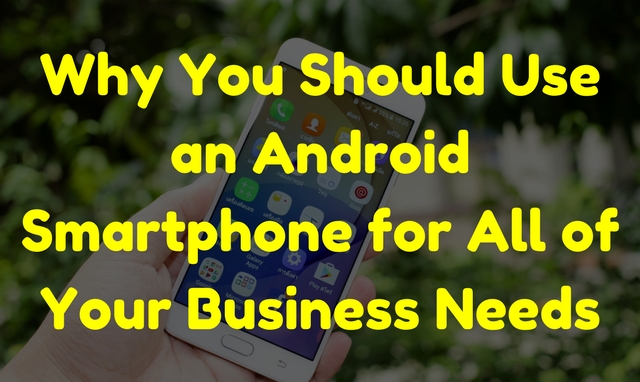
Android and iPhone smartphones have drawn even with one another in terms of functions.
Both platforms have the same major apps, and the iPhone has access to Google’s software suite that includes Google Maps and Google Docs.
So why go with an Android device over the iPhone when you’re searching for a phone for work? Discover four reasons why an Android smartphone can support your business needs.
Keep Personal Data Separate
Android allows you to set up different profiles on your phone so that you don’t have to mix business with personal accounts.
But the convenience is more than simply having a separate profile login on your phone.
Your IT department uses what’s known as an enterprise mobility manager (EMM) application on your phone to gain access to your work information profile on your phone, enabling your IT managers to offer updates or troubleshoot your device remotely.
The benefit of having an EMM app on an Android phone comes down to convenience:
You only need one phone for both work and personal purposes, and the EMM lets you keep your personal information private.
Integrate Your Smartphone With Microsoft Programs
Microsoft Remote Desktop, Office, and OneNote all have Android apps that integrate with Android smartphones.
Get your work done on the go, review important meeting documents, or start a new project without using your laptop.
The apps come with full functionality for ease of use and ability to create documents that you can transfer to desktop devices.
Microsoft Office 365 requires a subscription for use and works with Office Mobile for Android.
The drawback is that the app doesn’t fully support all of the document features you can find in the desktop version of Office 365. However, you can use a third-party app that integrates with Office 365.
Gain Access to Cloud Services
People who work outside the office need to get access to important files, and they need to do it securely.
Android has apps for all the major cloud storage providers such as Dropbox, but Android also works with local servers.
Your company’s IT department may also permit both a commercial and in-house server depending on the security needed for files.
One Android smartphone that’s great for business use is the Samsung Galaxy S7 Edge.
The Galaxy S7 is a powerful smartphone with a Snapdragon 820 processor for fast-touch response and almost no wait time for apps to launch, two key elements to helping you handle your workday demands.
Getting access to your files from the cloud through a reliable and fast connection such as T-Mobile’s 4G LTE network, can also help you avoid lags in time spent waiting for your files to download from servers.
All IT administrators require virtual private networks (VPNs) to access the file servers, regardless of whether the servers are commercial ones or not. Many VPNs offer their own apps for ease of service use.
To gain access, users log into these file servers through a VPN, which can mitigate some of the concerns associated with security breaches.
Send Texts to Your Desktop
Text messages are an important part of conducting business. But they create interruptions since you need to stop what you’re doing and pick up your phone to check the message and reply.
Once a conversation starts through text messaging, you may find it difficult to put down the phone and focus on the work in front of you.
The obvious solution is to make a phone call, but placing a call may not always be possible. Instead, use an app that sends your texts to a desktop device to maintain a steady conversation and stable workflow.
The DeskSMS app, for example, lets you send and respond to text messages anywhere you can open web browsers and review your email. You can also find an Android tablet version of the DeskSMS app.
The features above represent only a few of the strengths that Android brings to the business world.
The Android operating system is customizable, easy to configure, and intuitive to use.
Every employee in a company or organization can benefit from the apps and features that using an Android smartphone for business offers.
